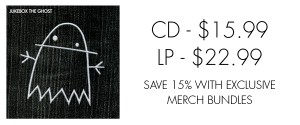
“So let go/ Of the world, you know/ There’s something waiting for you/ In the Great Unknown.”
After they’d already been growing in popularity for a while, this tongue-in-cheek chorus of their newest single put Jukebox the Ghost on the list of indie-pop bands to watch this summer. The message of “The Great Unknown” is little worrisome — What exactly is waiting for you? — but ultimately freeing. And how much stress can it induce when the lyrics are accompanied by such a catchy beat? This is a trend of Jukebox the Ghost’s eponymous new album, released on Oct.
21. It’s full of sing-along refrains that, when you hear them back, you realize are also life lessons. This is one of Jukebox’s lyrical strengths. It’s tough to balance life lessons with cliche, but somehow, Jukebox continues to pull it off.
Some critics disagree, claiming it’s a lot more trite, and I see where they’re coming from. For example, in “The One,” the morose, “I don’t think I can take it/ Another heart breaking/ Another whole world crumbling in two” is followed by poppy synth beats. The juxtaposition feels contrived. This criticism is valid; there’s been a hell of a lot of songs called “Girl,” sung by some boy about some, well, girl, and it comes across as a bit too vague.
Jukebox’s poppier vibe on this album could be considered an over-simplification by some, a masquerade of their discomfort, but I think it’s very appropriate. Jukebox’s apparent awkwardness around serious emotions might be exactly what has led them to such acclaim from the teen and 20-something crowd; we’re the same way. We’re often no more articulate, fumbling with cliches and familiar melodies, in expressing love or not-love or fear of oblivion.
And sometimes, we do get it right. The last few songs aren’t as radio-friendly, but are slower and softer. The transition was marked by the first few lines of “Postcard”: “I don’t want you to feel broken/ I just want you to feel good/ Let’s put away all those past indiscretions/ Let it go, do you think you could?” With these oddly familiar lines, they’re saying something we may have wished to say to someone else, but maybe haven’t had the chance to. It’s wonderful to hear them out loud.
“Undeniable Love,” the penultimate song, shows what can happen when the band experiments a bit more musically. The album opens with compelling drums and is peppered with harmonies, but is dominated by fairly standard piano pop. “Undeniable Love,” however, is composed of gospel-type harmonies and sparse accompaniment. I hope for more risky songs like this in the future; the band is talented enough to move far beyond convention. The last song, “Show Me Where It Hurts,” is a soft, sweet ballad. It’s far different from the pop the album started with, demonstrating the full scope of Jukebox’s abilities, and full hope for all that they could attempt in the future.
